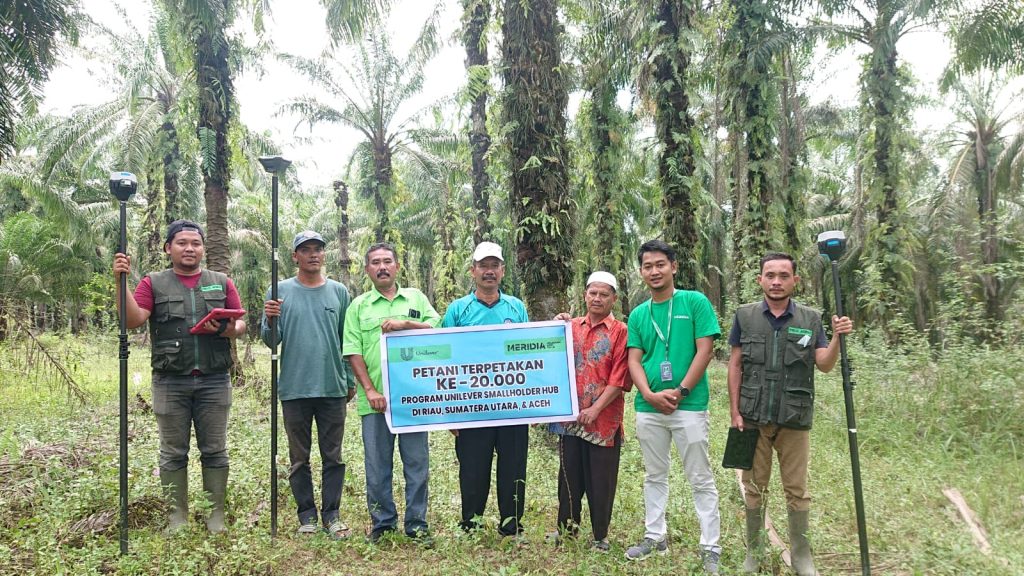Joint efforts of Unilever and Meridia are mapping Indonesian oil palm smallholders to facilitate RSPO Certification, increasing farmers’ climate change resilience and compliance with EUDR regulations.

Unilever, a founding member of RSPO, and leading agritech company Meridia are putting smallholder farmers on the map – literally. Leveraging Meridia’s expertise in collecting and verifying field and farmer data, the joint initiative facilitates the RSPO Certification process and the integration of smallholder farmers into Unilever’s supply chain.
Meridia worked closely with smallholders to map their farms, with the farmers’ consent, gathering crucial field data to lay the groundwork for identifying those eligible for RSPO Certification and inclusion in Unilever’s sustainable sourcing initiatives.
To date, 28,000 smallholders have been successfully mapped in Aceh, North Sumatera and Riau. Through this programme, baseline data has also been collected to provide more insight on smallholder farmers’ socio economic condition. The collaborative effort not only fosters environmental conservation and farmers’ resilience to climate change, but also facilitates compliance with European Union Deforestation Regulation (EUDR), ensuring continued access to the regulated EU market.
Challenges in mapping farms and collecting farmer data
Oil palm smallholders with limited GAP training have limited access to regulated supply chains. This not only keeps their incomes low, but also increases the risk of deforestation and farmers’ susceptibility to the impacts of climate change. Moreover, smallholders often work through intermediaries, which adds obstacles to traceability and sustainability efforts.
Mapping geo locations, creating polygon maps and farmer’s databases comprised the first crucial step to support smallholders in learning good agricultural practices, paving the way for them to become RSPO Certified. Certification opens the doors for farmers to sell their sustainable produce at a premium, helping to improve their livelihoods. Improving traceability also helps reduce deforestation risks in the supply chain as well as responds to challenges in large-scale palm oil farm mapping, such as poor Internet access in remote locations, extreme weather conditions, and limited farm boundary markings.
The initiative’s primary challenge was identifying and engaging independent smallholders selling through intermediaries with limited transparency.
“Identifying and sensitising smallholders who sell through opaque channels proved to be a significant hurdle,” shared CCO, Beatrice Moulianitaki, Meridia’s Chief Commercial Officer. “Additionally, ensuring full traceability to mills and plantations was challenging due to the complexity of the supply chain.”
Crucial local support
The support of local partners was invaluable in the mapping process. In time, the farmers were identified and sensitised through focused outreach activities in mill-sourcing villages, which were carried out in collaboration with local officials, training service providers, and farmers’ groups or cooperative representatives. In partnership with the local partners, Meridia’s team conducted interviews and farm mapping with individual farmers.
“Meridia’s innovative solution for farm mapping provided a breakthrough in addressing the challenge of identifying independent smallholders,” said Achmad Adhitya, Sustainable Sourcing PTPN Manager, Unilever. “By meticulously gathering accurate, reliable, and consistent farmer data through comprehensive mapping, smallholders are seamlessly integrated into Unilever’s transparent and traceable supply chains. This process grants them access to vital training and support needed for the transformation of palm oil farming practices and the enhancement of their livelihoods.”
Beyond the immediate benefits for farmers, this collaborative effort addresses the urgent need to promote sustainability in palm oil production. This not only fosters environmental conservation and resilience to climate change but also facilitates compliance with EUDR regulations, ensuring continued access to the regulated EU market. Compliance with EUDR regulation safeguards smallholders’ access to regulated markets, driving lasting change in palm oil farming practices to foster industry-wide sustainability.
The partnership between Unilever and Meridia seeks to support and empower 40,000 palm oil farmers in Aceh, North Sumatra, and Riau by 2025.

Partnerships for innovative solutions
The joint initiative highlighted the paramount significance of partnerships and community engagement in employing effective innovative solutions to propel sustainability efforts within intricate supply chains.
The meticulous collection of precise farmer data proves to be strategically invaluable, serving not only as a pathway to RSPO Certification and compliance with EUDR regulations but also as a gateway to participation in the Unilever Smallholder Hub Programme. The success of the Smallholder Hub Programme determines its scalability potential, offering a replicable model for similar sustainability initiatives across different regions and sectors.
For a closer look at the joint mapping project of Unilever and Meridia, watch this video. At the upcoming Europe Sustainable Palm Oil Dialogue taking place on 22 May 2024 in Brussels, Belgium, where smallholders will be a key part of the discussion under the theme, Inclusive Pathways for Climate-smart Solutions. Visit the SPOD website to learn more and register.
Keep reading

Book Your Slot for the Additional prisma Clinic Session at RT2025

Advancing Jurisdictional Certification in Sabah: Strengthening Collaboration Between RSPO, UNDP, and Jurisdictional Approach System for Palm Oil (JASPO)
Call for Expression of Interest: Independent Investigation of a Complaint

Leading Labels: RSPO Among Top Sustainability Labels in Dutch Market

The 21st International Oil Palm Conference Successfully Took Place in Cartagena, Colombia

Top Performers of the 2025 Shared Responsibility Scorecard

ACOP 2024: RSPO Market Trends Resilient Despite Global Challenges

RSPO: Actions for the Certification of Sustainable Palm Oil Production




